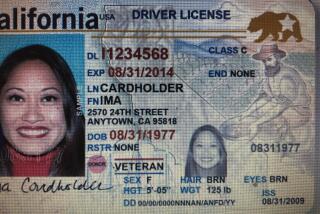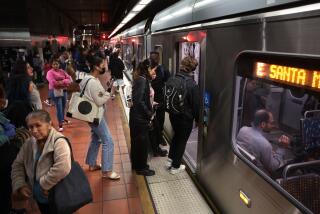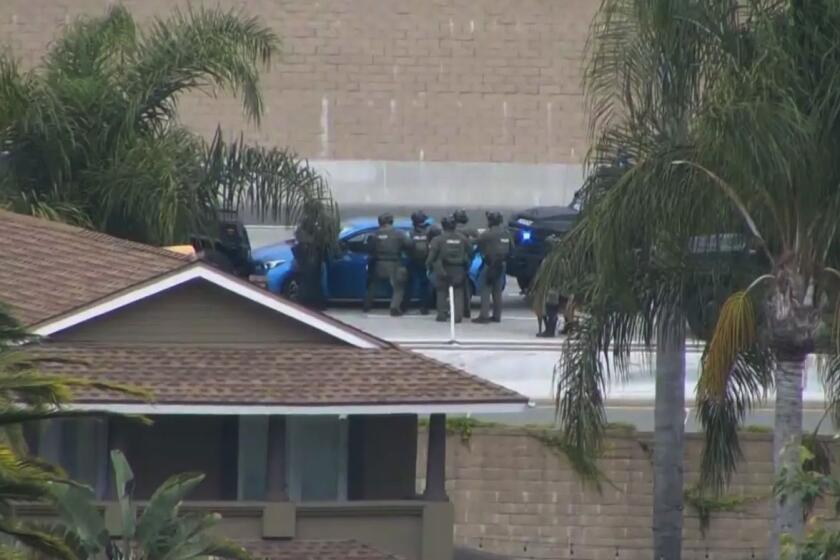Reverberations in National City, San Diego : Cities Move to Lower the Boom on Boxes
Highland Avenue has always been the weekend cruise in National City, a wildly popular, 20-block stretch that on weekends caters mostly to teen-agers and young adults.
It’s no surprise, then, that National City police are out in force--patrolling with their ears wide open.
Since July, 1988, National City police have cited about 350 motorists--mostly young people cruising Highland on the weekend--for playing their car stereos too loudly. They’ve confiscated 400 car speakers, including a 6-foot-tall, 250-pound, 500-watt back-seat boomer. Soon, they’ll destroy several pieces of equipment confiscated from repeat offenders, who insisted on breaking the city’s noise ordinance a few times too many.
“We’re having some effect,” said Officer Ray Allen. “It has just been such an ongoing problem that we can’t just issue warnings anymore. No one pays attention to those.”
San Diego Listening
That approach is music to the San Diego City Council’s ears. In September, the council most likely will beef up its own noise ordinance, giving police more authority to cite drivers with loud car stereos and increasing the punishment for breaking the law.
The proposed changes, city officials say, will be more stringent than those that are changing the tune in National City.
If an amendment to San Diego’s noise ordinance is approved, police no longer will need a public complaint to confiscate as evidence car stereo equipment that generates noise and vibration farther than 50 feet away.
If the equipment cannot easily be removed from the car, police could confiscate the car as evidence. If a driver is convicted of playing his car stereo too loudly, a misdemeanor, he could receive a maximum $1,000 fine (the law now says $500) and/or six months in jail.
And the prosecutor would have more authority to request that the impounded stereo equipment (but not the car) be destroyed.
City Council members “want to let the people, especially those with boom boxes, know they are serious about trying to control that type of noise,” said Deputy City Atty. Hal Valderhaug, who helped draft the proposed changes.
The new laws would go into effect about six weeks after being adopted by the council, Valderhaug said.
City attorneys say the proposed changes really aren’t as stringent as they sound. Officers would not have carte blanche to impound cars with stereos turned up loud, and confiscated cars would be held only until the equipment was removed or a hearing was held, attorneys said.
“This is not a situation where we are confiscating property to summarily abate a nuisance,” said Richard Pinckard, another deputy city attorney. “I would hope that our police officers use adequate discretion. There’s always room for abuse when you’re enforcing an ordinance.”
Problem Increasing
City officials say the problem of “boom boxes” in cars is getting noticeably worse, particularly around beaches and parks. As sound technology improves, more drivers are investing in powerful equipment that sounds clear, even when played at high volumes. And gang members often compete with their systems, battling rivals with decibels and bass, officials say.
“There really is no limit to the amount of power you can put in an automobile,” said Dave Sprosty, vice president of sales for Mad Jack’s, a seven-store sound specialist chain in San Diego that sells home and car electronics and alarm equipment. “We sell one amplifier that has 1,000 watts.”
Larry McGlone, a noise abatement officer for the city of San Diego, said his department has noted such progress.
“More and more people are finding out about the systems, adding them to their cars and turning up the volume. They’re getting them louder, and they’re getting (them) more regularly,” McGlone said. “We get a lot of complaints about it, but at the present time the people know we can’t do much about it. We’ve had an ordinance on the books, but it hasn’t been as clear cut as this new (proposed) one.”
In National City, police last year were inundated by complaints from residents half a mile from Highland Avenue, who still were in earshot of the mega-watt sound systems blaring from the cruisers. Drivers with 700- to 800-watt stereos (a normal car radio carries 20 to 40 watts) and woofer-packed speakers were cruising more and more often with volumes set at ground-shaking levels, said officer Allen.
Keep Noise Inside Car
After three months of issuing only warnings, police began enforcing a little-known ordinance that requires a driver to keep the sound of his car stereo confined to the car itself, Allen said.
Since last July, National City officers have cited hundreds of motorists, who normally face fines of $120 to $240. They also have confiscated as evidence hundreds of speakers, especially those belonging to repeat offenders. In fact, a batch of impounded equipment from repeat offenders, including the mammoth 6-foot speaker, soon will be destroyed.
And occasionally, when removal of the equipment might damage it or the car, National City police have impounded the cars, Allen said, adding that factory-installed stereos or speakers that require the car to be disassembled usually aren’t removed by police, who simply issue a citation and photograph the unit.
But the crackdown has been only partly effective. Officers have had to set up roadblocks on Highland to deter motorists with boom boxes, and often deploy officers in unmarked cars to catch drivers who turn the volume down only while passing uniformed police.
“We still have the problem,” Allen said. “We have teen-agers, and we have young adults out there, too. All of them have really nice vehicles and stereos they want to show to their friends. The noise is to the point where it actually shakes the ground.”
Packing More Wallop
The proposed changes to San Diego’s ordinance will be more stringent, city officials say, an assurance that residents of heavily trafficked streets in the city applaud.
“It has gotten so bad. People with loud sound systems really have become a nuisance,” said Jeanne Lenhart-Wright, a 44-year-old retired high school teacher and resident of South Mission Beach. “Some people have tried to call the police, because they know there is a vehicle ordinance on the books. But the current ordinance just doesn’t have any meat behind it.”
Lenhart-Wright, who heads the South Mission Beach Concerned Citizens group, testified Aug. 9 before the City Council’s Public Facilities and Recreation Committee, which later endorsed the proposed changes.
“South Mission Beach has about 4,000 residents and is about a mile long. When you have one person, just one, drive down the street and his stereo can be heard for half a mile, in a sense, he has disturbed half the people,” Lenhart-Wright said.
“Technically speaking, the sound systems are fabulous. I love music, all kinds of music,” she continued. “But, when it disturbs the peace of the general population, it doesn’t matter if it’s Beethoven, the Beatles, whatever. It’s disruptive at the wrong place and wrong time.”
Citizen groups in beach communities such as Crown Point, La Jolla Shores and Del Mar also are organizing to encourage stricter city laws against boom boxes, she said.
“I’m sure that the people who live out near the beaches and get most of the problem would like something more harsh, and with reason,” said Valderhaug, of the city attorney’s office. “The people who think this is the minimum that should be done (are) the people who are most impacted, I suppose.”
But stereo equipment dealers who learned of the proposed changes said the wording of the amendment is too general and warned citizens to use discretion in their complaints.
“The overwhelming majority of people who come into our stores aren’t looking to entertain those around them. We tell them there are certain limitations. You have to draw the line somewhere,” said Sprosty, of Mad Jack’s. “But I think more people need to be involved with understanding both ends of it. The wording is too hard-lined, and it needs to be a lot more specific than it is. Subjectivity is very high with that type of rule.”
More to Read
Start your day right
Sign up for Essential California for news, features and recommendations from the L.A. Times and beyond in your inbox six days a week.
You may occasionally receive promotional content from the Los Angeles Times.






